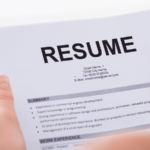The hiring process may seem straightforward but various reasons can lead to an employer rejecting an application.
Knowing these reasons is necessary for job seekers striving to improve their chances of success.
If you’ve been facing rejections, you’re not alone; there are ways to turn things around.
The Hiring Process
The hiring process involves several steps, from submitting your application to attending interviews and undergoing background checks.
Employers seek candidates who meet the job requirements and align with the company’s culture and values. It’s a competitive arena where the slightest mistake can cost you an opportunity.
Common Reasons for Rejection During the Hiring Process
The reasons for rejection can be numerous and varied.
1. Resume and Application Issues
Poorly Formatted Resumes
A resume is your first impression, and a poorly formatted one can be a deal-breaker. Employers often use applicant tracking systems (ATS) to filter resumes. A cluttered or inconsistent format can prevent your resume from passing through these systems. Ensure it’s clear, professional, and easy to read.
Typos and Grammatical Errors
Nothing screams unprofessional, like typos and grammatical errors. They suggest a need for more attention to detail. Before submitting, triple-check your resume and cover letter. Tools like Grammarly can be your best friend when catching pesky mistakes.
Lack of Relevant Experience or Skills
Tailoring your resume to highlight relevant experience and skills is crucial. A generic resume may fail to showcase your suitability for the role. Focus on key achievements and responsibilities that align with the job description.
Overly Generic Resumes
An overly generic resume fails to capture the employer’s interest. Customize each application to reflect the specific requirements of the job. Demonstrating a clear connection between your experience and the role can significantly boost your chances.
Misleading or False Information
Honesty is the best policy. Misleading information or exaggerations can easily be uncovered during background checks or interviews. It’s better to be honest about your qualifications and experience than to risk getting caught in a lie.
2. Lack of Preparation for Interviews
Failure to Research the Company
Not researching the company shows a lack of interest and preparation. Employers expect candidates to understand the company’s mission, values, and recent achievements. Spend time on their website and social media to gather relevant information.
Inability to Answer Common Interview Questions
Being unprepared for common interview questions can derail your chances. Practice answering questions like “Tell me about yourself” and “Why do you want to work here?” Think about your answers and rehearse them to ensure clarity and confidence.
Poor Understanding of the Job Role
Understanding the job role is essential. You’ll likely be overlooked if you can’t articulate how your skills and experience match the job requirements. Review the job description thoroughly and prepare to discuss how you can contribute to the role.
Inappropriate Attire and Behavior
First impressions matter. Dressing inappropriately or displaying unprofessional behavior during the interview can hurt your chances. Dress according to the company’s culture and maintain a professional demeanor throughout.
Lack of Questions for the Interviewer
Not having questions for the interviewer can signal disinterest. Prepare thoughtful questions about the role, team, and company culture. It shows that you’re genuinely interested and engaged.
3. Poor Communication Skills

Ineffective Verbal Communication
Effective communication is a prized skill in any job. Speaking clearly or using too many fillers can create a positive impression. Practice speaking confidently and concisely.
Inability to Articulate Thoughts Clearly
Being unable to articulate your thoughts clearly can be detrimental. Slow down, think through your responses, and aim for clarity. Practicing with a friend or mentor can help improve this skill.
Overuse of Filler Words and Jargon
Using too many filler words or jargon can make you appear less competent. Practice speaking more deliberately, using straightforward language that everyone can understand.
Poor Listening Skills
Listening is as essential as speaking during an interview. Show active listening by nodding, making eye contact, and responding appropriately to the interviewer’s questions and comments.
Ineffective Non-Verbal Communication (Body Language)
Non-verbal cues like eye contact, posture, and facial expressions play a significant role. Avoid crossing your arms, slouching, or displaying nervous habits. Positive body language can enhance your overall impression.
4. Cultural Fit Issues
Misalignment with Company Values and Culture
Every company has its unique culture and values. If you don’t fit into that culture, it’s a mismatch. Research the company’s culture and reflect on whether it aligns with your values and working style.
Inability to Connect with the Team
Building rapport with potential colleagues is crucial. Employers look for candidates who can integrate smoothly into their teams. Be personable and show genuine interest in connecting with the team during interviews.
Lack of Enthusiasm or Passion for the Company Mission
Show your enthusiasm for the company’s mission. Employers hire candidates who are passionate about what they do. Express your excitement and how the company’s mission resonates with you.
Overemphasis on Personal Goals Over Company Goals
While having personal career goals is essential, overemphasizing them can be a red flag. Employers want to know how you can contribute to their success. Balance your aspirations with the company’s objectives.
5. Negative Attitude and Unprofessionalism

Negative Comments About Past Employers
Badmouthing previous employers or colleagues reflects poorly on you. It suggests a lack of professionalism and could indicate future conflicts. Stay focused on what you learned from past experiences.
Complaints and Negativity During the Interview
Complaining or displaying negativity can be off-putting. Employers seek cheerful and solution-oriented individuals. Keep the conversation constructive and avoid airing grievances.
Overconfidence or Arrogance
Confidence is reasonable, but overconfidence or arrogance can be a turn-off. Be humble and gracious, acknowledging the contributions of others and showing a willingness to learn.
Lack of Punctuality and Respect for Interview Time
Late for an interview demonstrates poor time management and a lack of respect for the interviewer’s time. Aim to arrive at least 10 minutes early to make a positive impression.
6. Inadequate Technical Skills
Failure in Technical Tests or Assessments
Technical tests are designed to assess your practical skills. Failing these tests can signal a lack of proficiency. Practice relevant skills and take mock tests to prepare.
Inability to Demonstrate Practical Skills
Beyond theoretical knowledge, demonstrating practical skills is essential. Be prepared to showcase your abilities through examples, portfolios, or live demonstrations.
Lack of Up-to-Date Knowledge in the Field
Employers want candidates who are continuously learning and adapting. Engage in professional development activities to keep your knowledge up-to-date.
Insufficient Proficiency in Required Tools and Technologies
Proficiency in the tools and technologies specific to the job is a must. Highlight your experience with these tools on your resume and be ready to discuss them during the interview.
7. Insufficient Experience or Qualifications
Mismatch Between Job Requirements and Candidate’s Experience
A mismatch between your experience and the job requirements can lead to rejection. Tailor your resume to highlight relevant knowledge and skills that align with the job.
Overqualification Concerns
Being overqualified can sometimes be a disadvantage. Address this concern by expressing your genuine interest in the role and how it fits into your long-term career plans.
Under qualification Concerns
Conversely, being underqualified can also be a hurdle. Focus on your potential and willingness to learn. Highlight transferable skills and relevant experiences that demonstrate your capability.
Gaps in Employment History
Employment gaps can raise questions. Be prepared to explain these gaps positively, focusing on productive activities or learning experiences during that time.
8. Background Check and References Issues
Inconsistent Information During Background Checks
Consistent or accurate information during background checks can lead to rejection. Ensure all details provided are accurate and truthful.
Negative Feedback from References
Negative feedback from references can be damaging. Choose references who can speak positively about your work ethic and character. Brief them on the role to ensure their feedback aligns with the job requirements.
Legal Issues or Criminal Record
Legal issues or a criminal record can be a barrier. Be upfront about any potential concerns and provide context if necessary. Some employers may be willing to consider candidates with a clear rehabilitation plan.
Poor Online Presence or Inappropriate Social Media Activity
Your online presence matters. Inappropriate posts or unprofessional behavior on social media can hurt your chances. Clean up your online profiles and present a professional image.
9. Overcrowded Job Market and Strong Competition
High Volume of Applicants
In a crowded job market, standing out is challenging. Tailor your application to highlight unique skills and experiences that set you apart.
Comparison with Stronger Candidates
Being compared to stronger candidates is inevitable. Focus on continuous improvement and learning to enhance your profile.
Economic Factors Affecting Hiring Decisions
Economic conditions can influence hiring decisions. Stay informed about market trends and be flexible in your job search approach.
Internal Hiring Preferences
Sometimes, internal candidates are preferred. If you’re an external applicant, highlight what fresh perspective or unique value you can bring to the company.
10. Miscellaneous Factors
Budget Constraints and Hiring Freezes
Budget constraints and hiring freezes can delay or cancel hiring plans. Stay patient and keep applying to other opportunities.
Changes in Job Requirements or Company Strategy
Business needs evolve, leading to changes in job requirements. Stay adaptable and emphasize your ability to adjust to new expectations.
Timing and Availability Issues
Availability issues or poor timing can affect hiring decisions. Be clear about your availability and willingness to start when required.
Unforeseen Circumstances (e.g., Global Events, Pandemics)
Events like pandemics can disrupt hiring processes. Continue building your skills and networking to stay prepared for when opportunities arise.
Recap
Navigating the hiring process successfully requires awareness and preparation. Understanding the common reasons for rejection and addressing them proactively can significantly improve your chances.




